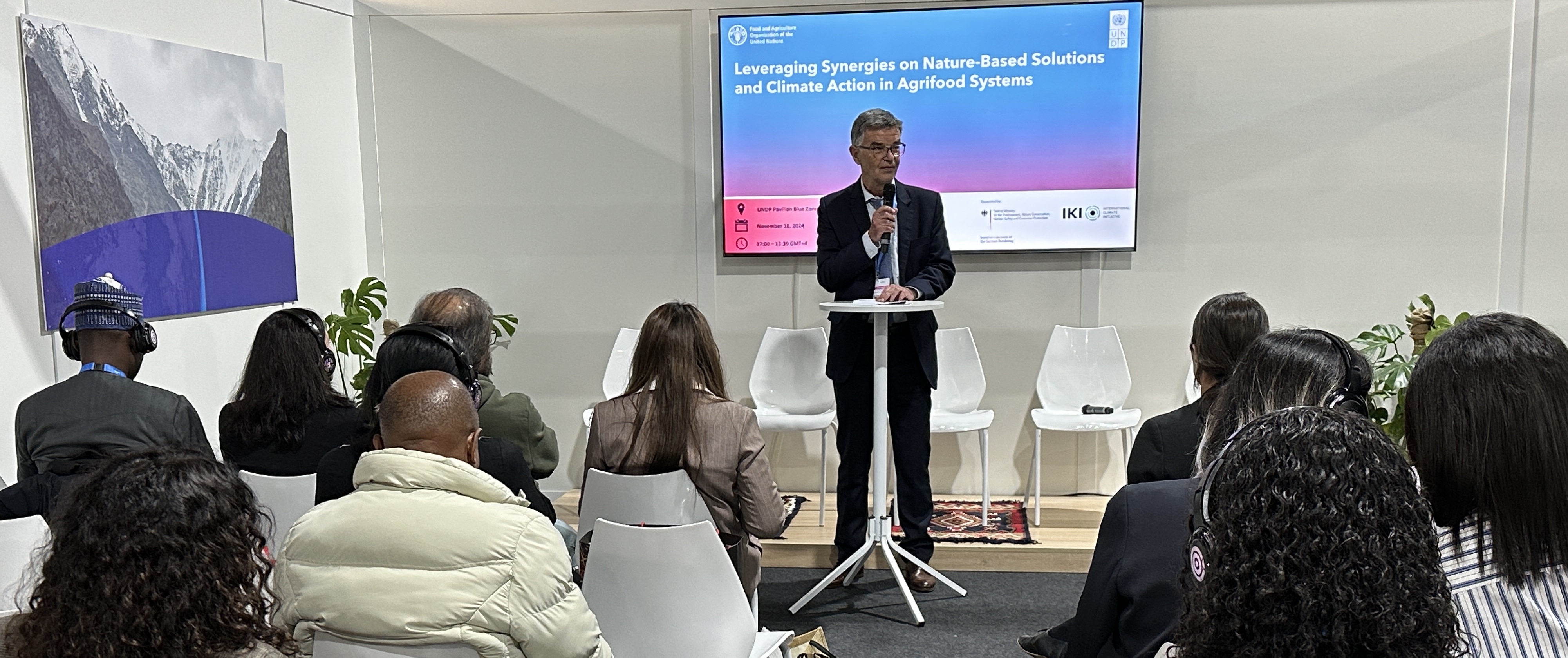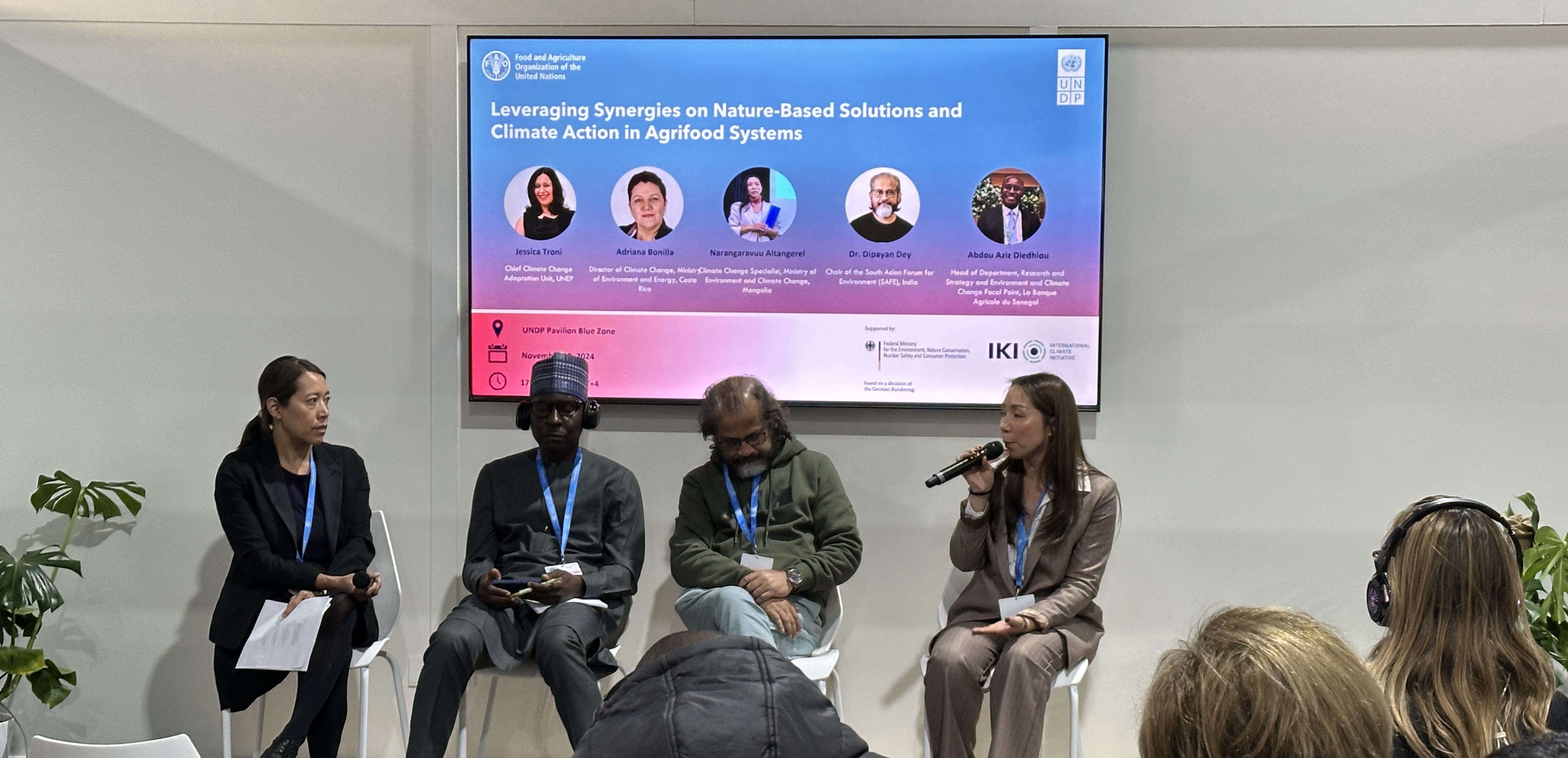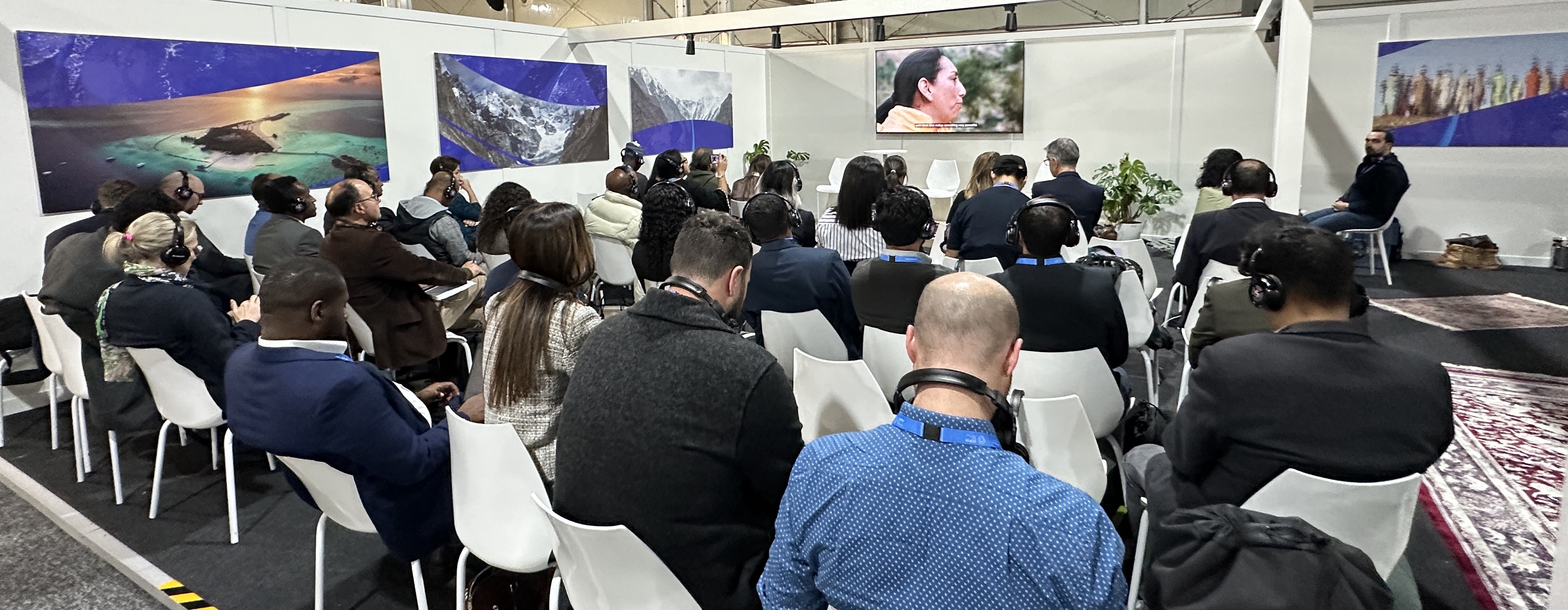
“We are excited to extend SCALA until 2028!”.
With these words, Ulf Jaeckel, Head of Division at Germany’s Federal Ministry for the Environment, Nature Conservation and Nuclear Safety (BMUV), confirmed three more years for the flagship climate programme that helps developing countries design and implement agriculture solutions at national, regional and local levels.
Dr. Jaeckel was speaking during a COP29 event hosted by the United Nations Development Programme (UNDP) and its SCALA partner, the Food and Agriculture Organization of the United Nations (FAO), on leveraging synergies on nature-based solutions (NbS) and climate action for nationally determined contribution (NDC) and national adaptation plan (NAP) implementation in agrifood systems.
Biodiversity mainstreaming and NbS are set to have a heightened focus in the new look SCALA, as countries increasingly seek holistic solutions that address climate, biodiversity and environmental challenges, while tackling hunger, poverty and social injustice.
What is SCALA, and why is it being extended?
Since 2021, the Scaling up Climate Ambition on Land Use and Agriculture through NDCs and NAPs (SCALA) programme has been working in 12 core countries in Africa, Asia-Pacific and Latin America to scale up the evidence base for targeted climate interventions in agrifood systems, support governments to develop and implement national climate plans, and catalyse increased climate investment for agrifood solutions. SCALA – funded by BMUV through the International Climate Initiative (IKI) – also has a Private Sector Engagement Facility, which currently operates in 11 countries, offering matchmaking services and seed funding to agrifood entrepreneurs with innovative climate solutions.
One of the compelling reasons for extending SCALA is the established architecture of collaboration it has on agrifood-related sectors and thematic areas which are critical to climate and biodiversity action, and which are not served under any other comparable programme.
“With its integrated and transformative approach, the SCALA programme is perfectly in line with the decisions from the recent Convention on Biological Diversity COP16 to drive forward better integration of climate action and biodiversity conservation,” said Dr. Jaeckel.

At a climate change conference with a major thematic focus on climate finance, Dr. Jaeckel further remarked on SCALA’s ability to leverage “private sector investments in the sustainable agriculture and land-use sector to meet the demands of increased finance for both climate and biodiversity actions”.
Reaction from programme leads
Welcoming the extension, Julie Teng, SCALA Global Coordinator (UNDP), said, “We are so grateful to BMUV and IKI for giving us the opportunity to continue working on this wonderful programme, which is bearing fruit in so many countries. From a UNDP perspective, SCALA is a perfect example of the type of multi-partner, multi-thematic programme that can help us bring about the transformational change necessary to achieve the Global Climate Promise. UNDP is proud to lead implementation of this programme with our partner of many years, FAO. I feel we complement each other’s work in a way that is probably quite rare among international agencies. Given the urgent need to scale up climate solutions in the land-use and agriculture sectors, I hope we can be a beacon for other organizations to team up and get the best out of each other to help people and planet.”
Julia Wolf, SCALA Global Coordinator (FAO), echoed Ms. Teng’s words: “This is a critical moment for climate and biodiversity action, and if we don’t address the agriculture component of the challenge we are not going to achieve the goals of the Paris Agreement or the Global Biodiversity Framework. We are so grateful for the faith that BMUV and IKI have shown in us and for the continuing opportunity to work side by side with our UNDP partners every day. But we cannot rest on our laurels – FAO is launching a major global analysis of NDCs tomorrow during Food, Agriculture and Water Day that will reveal specific gaps and challenges related to agrifood systems. We need USD 1.15 trillion a year until 2030 to transform these systems, which is about 40 times more than we currently spend! As Julie said, SCALA shows the way for others to follow – but we are also willing to learn from the best practices of others. There is no time to waste – we must come together now to drive the change we want to bring about.”

Side event in brief
The SCALA announcement took place at a side event in the UNDP Pavilion on 18 November. The event featured a framing presentation by Jessica Troni, Head of Adaptation Unit, UN Environment Programme, who spoke about integrated solutions for nature and climate change adaptation. It also included a fascinating panel discussion moderated by Julie Teng with representatives from government ministries and the agrifood banking sector: Adriana Bonilla, Director of Climate Change, Ministry of Environment and Energy, Costa Rica (TBC); Narangaravuu Altangerel, Climate Change Specialist, Ministry of Environment and Climate Change, Mongolia; Dipayan Dey, Chair of the South Asian Forum for Environment (SAFE), India; Abdou Aziz Diedhiou, Head of Department, Research and Strategy and Environment and Climate Change Focal Point, La Banque Agricole du Senegal. To wrap up, Julia Wolf delivered closing remarks on behalf of the SCALA programme.

More details about the new phase of the SCALA programme will be published in the coming weeks at:
